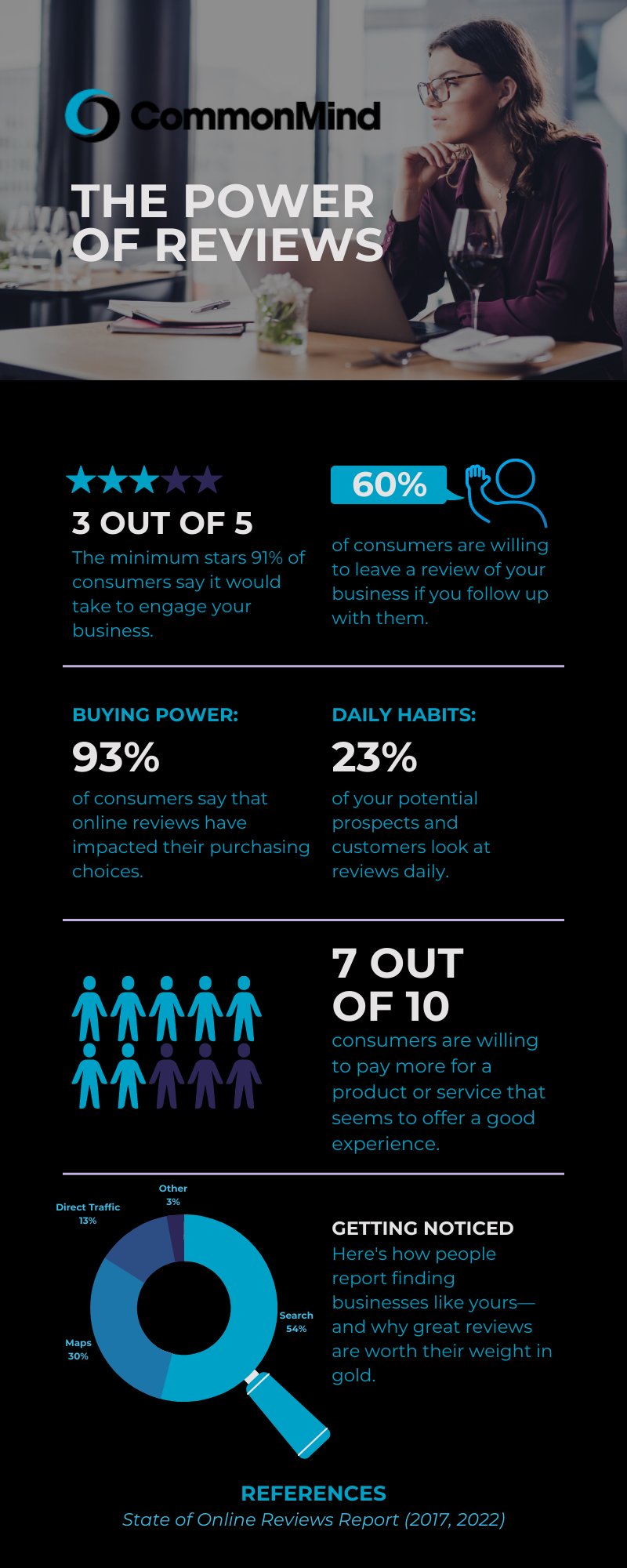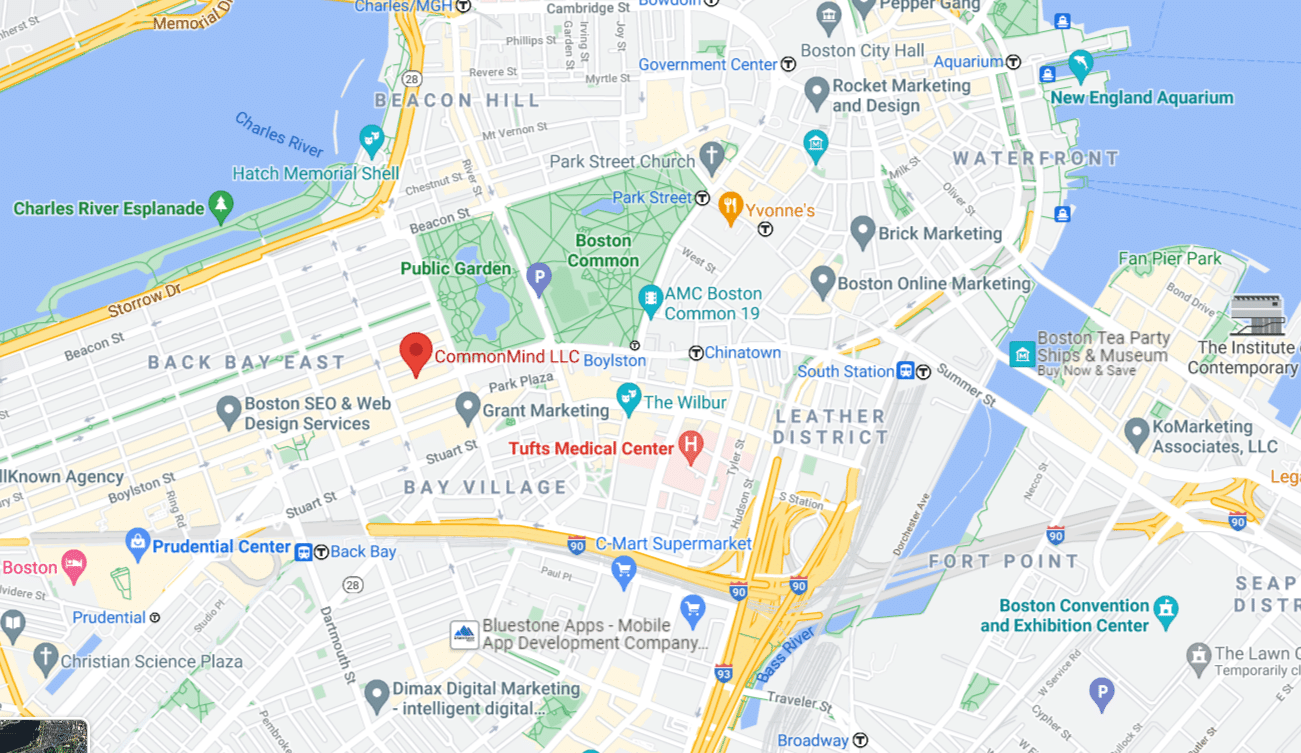By Jordan Henri | December 14, 2022
It’s no secret that reviews have a significant impact on the way that your brand, products, or services are perceived. When most of your potential online traffic is finding you from either a search engine or your business listing on Google Maps, it’s worth considering reviews as part of your SEO strategy.
There’s more to it than simply racking up reviews in bulk, though.
- What happens if your business gets a negative review online?
- How do you correctly respond to a negative review?
- How do you deal with fake feedback online?
- Should you respond to positive reviews?
Today, we’re going to cover the answers to all these questions. Plus, we’ll give you examples you can use when responding to the reviews you do get.
Why Responding to All Reviews Matters
It’s natural to prioritize responding to a negative review—it’s part of the relationship you have with your current customers and what future customers are going to be looking at when they research your business.
- Responding to negative reviews and feedback shows that you’re willing to accept constructive criticism and, more importantly, offer a solution.
- Responses to negative reviews should be prompt, too—think within a week or less.
What about positive reviews?
You might think that a response to positive feedback isn’t necessary. They loved your product or service—what more is there to talk about?
The truth is that your audience wants to hear from you even if they’ve left positive feedback.
- Positive reviews are like free promotions for your business—the least you can do is show your appreciation with a response.
- Anyone researching your business is looking at whether or not you’re the solution to a problem that they have.
- Current and future customers want to know that you take their feedback (and business) seriously—and value that they chose you.
Even something as simple as thanking them for taking the time to leave a review helps. It shows that you’re listening to them, value their input, and care about their experience with your product or service.
Your responses to reviews have effects that go beyond the relationship with the customer who left the review. Responding to feedback of any kind often leaves a great impression on potential customers who take the time to look at your reviews section.

How to Respond to Negative Reviews
No matter how hard you try to avoid them, you’re likely to receive a negative review at some point. Mistakes happen—whether it’s an issue with your product, service, or a customer experience mishap.
The best way to respond to a negative review is to begin with an apology, thank the reviewer for sharing their thoughts, and acknowledge the results of the negative experience. This shows the reviewer that you’re taking their experience seriously—think of it like the online equivalent of active listening.
- If it’s appropriate, you can offer an explanation for what happened—not an excuse.
- Explain to the reviewer what you’ll be doing to address the problem so it doesn’t continue to happen.
- You’ll also want to include your next steps for the reviewer, if necessary. For example, provide an email address for the reviewer to follow up with you if further discussion is required.
- Lastly, kindly apologize once more before signing off as a best practice.
Here’s an example of what this looks like in action:
Hello {first name}, First, thank you for sharing your feedback. We are sorry that {negative aspect} didn’t meet your expectations. Clearly, we fell short, and we apologize.
In the future, we’ll make sure that the {situation or specific event} doesn’t happen again. The last thing we want to do is let our clients down. Moving forward, here’s what we’ll do to make it right: {solution}.
Again, we apologize, but we also hope you’ll consider giving us another chance. Feel free to reach out to {contact within your organization} personally at {email address}, and they’ll see to it that we get it right this time.
What about false or inaccurate reviews?
Unfortunately, false reviews are part of life as a business. Whether they were purchased by the competition or simply reviews from trolls online, at some point, you’ll probably have to deal with responding to false reviews.
- Start by investigating whether or not the reviewer is actually talking about your business or if they got you mixed up with someone else.
- Sometimes, reviews are left for the wrong company. In this case, politely explain that this isn’t the right page and ask for the review to be removed.
- If the review is rooted in any truth, begin by apologizing for where you went wrong—just like you would with a negative review response.
- Even if the feedback is scathing, you should respond with politeness. Think of this as an opportunity to show people the right face of your brand.
Some reviewers leave rude feedback—don’t feed into this. Even if you’re tempted to respond in kind, remember that other customers may perceive you differently when responding to a rude review with the same tone.
If you’re not sure whether or not the reviewer is being honest, kindly ask for some kind of proof:
- “When were you in?”
- “Which location did you visit?”
- “May I ask who you spoke to?”
This helps you verify if you’re dealing with a real customer.
If the review is fake, comment professionally saying that the review is false and has been reported to the site moderators.

How to Respond to Positive Reviews
Luckily, responding to positive reviews is much easier than their negative counterparts.
- Start by greeting and thanking the reviewer for taking the time to write a review and for sharing their kind words. This shows that you care about them and value what they have to say.
- Next, acknowledge the joy or satisfaction that your product or service brought to them.
- You don’t want to look like you’re replying to every positive review with a copy-and-paste message. Read their review and personalize your message based on what they enjoy about your product or service.
- Include a reminder that customer satisfaction is your primary focus and that you’re glad everything worked out! This is also a subtle opportunity to highlight your product or service that the customer enjoyed.
- Finally, thank the reviewer, wish them well, and sign off.
Here’s a great example of what responding to a positive review can look like. Remember, though—personalization is key: use this only as a starting point.
Hello {first name},
We appreciate the kind words! We’re so excited to hear that {first aspect reviewed positively} worked out for you. It’s always humbling to hear how we’re able to make an experience memorable for our {fans/customers/guests}.
We are also happy that you found {second aspect reviewed positively} {helpful/useful/etc.}. We’ve worked hard on that part of our company, and so we are glad to hear it made your day better.
Have a great day, and thanks again for the review!

How to Respond to Mixed Feedback
Some reviewers will leave mixed reviews about your product or service—they enjoyed one aspect of the experience but didn’t like another. Or maybe your product impressed them, but they didn’t enjoy the experience of getting it.
Whatever the case, the best practices for responding to this kind of review borrow a little from both negative and positive review responses.
- Begin with greeting and thanking the reviewer for taking the time to leave feedback.
- From there, acknowledge any positives that made the reviewer happy with your product or service.
- Now it’s time to address the negatives. Apologize for any missteps in customer service or issues with the product.
- Explain how you’ll use the feedback to correct any future problems.
- Sometimes, the negatives in a mixed review may outweigh the positives. If this happens, offer to make it up to the reviewer in a private conversation by leaving contact information.
- Finish off by thanking the reviewer and signing off with your name.
Here’s a great example of a response to mixed feedback that hits on all of these points:
Hello {first name},
First off, thank you for letting us know about your experience with {company/product/service}. We’re elated to hear that {aspect highlighted positively in the review}. Be sure that we’ll let {person/team/department responsible} that their work is appreciated!
However, it sounds like we could do better when it comes to {areas of criticism}. Sorry we fell short there. Moving forward, we’re going to {how you’ll address the criticisms}, so we hope you’ll stick around so that we can show you how important your feedback is to the team when we make these changes.
In the meantime, if there’s anything else you want to share with us please contact us at {email}.
Professional Responses Set You Apart
Whether it’s a positive, negative, or mixed review, the facts remain the same—your audience wants their voice to be heard. How you respond to this feedback sets you and your business apart from the competition.
Follow the tips in today’s article, and you’ll have the tools you need to:
- Respond to all feedback professionally
- Properly address any criticism
- Cultivate better relationships with your customers
If you have any more questions about reviews or SEO, we’d love to hear from you! Get in touch with us to learn more about how we can help you and your business.





